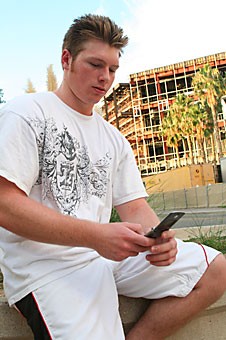Students may soon find themselves receiving text messages from their professors, clubs and the UA through a new text-messaging system.
After three years of planning and negotiations, Associated Students of the University of Arizona signed a contract with Mobile Campus last week, said Tommy Bruce, ASUA president.
The student service is different from a campus-wide text-messaging service currently in planning that would alert students to emergencies.
ASUA plans to use the former program to contact students regarding university updates and campus events, Bruce said.
To avoid spam, students’ cell phone numbers would not be released to outside organizations, but would be used only for ASUA-approved text messages, he added.
The program could be helpful because professors can text their students with quiz reminders or canceled classes, and clubs will be able to inform their members about event location changes or cancellations, Bruce said.
Students would need to individually sign up for each program they would like to receive text messages from, he added. Depeding on an individual’s cell phone plan, standard text-messaging rates will apply.
“”Communication is key with anything and today, people communicate with text messaging,”” Bruce said. “”This is a great opportunity for students and professors.””
Once the program is launched next month, professors and UA clubs will be given the opportunity to join the program, said Jessica Anderson, ASUA executive vice president.
Students can sign up for as many sources of messages as they like, she said. If they are receiving more messages than they would like, they can log onto Mobile Campus’s Web site and change their preferences.
Anderson said she has been working with Mobile Campus since 2005 to bring the messaging service to the UA.
“”Personally, I have a list of people who I send mass text messages to, almost everyone does this,”” she said. “”This is a great opportunity for the UA, and we are very excited about it.””
Mobile Campus is a way to connect communities on campus through text-message technology, said Clayton Stewart, marketing manager for Mobile Campus.
He added that students can also sign up to receive discounts and coupons for local and national vendors that are a part of the program. Circuit City is one national vendor, he said, and “”local vendors include Pita Pit and mom-and-pop pizza shops.””
As part of the contract, Mobile Campus donated $4,000 to ASUA, Stewart said.
In addition, Mobile Campus will donate one dollar to ASUA for every student who signs up for the program during the first year, he said. Every year after that, Mobile Campus will donate five percent of profit from the revenue they make from program vendors.
All of the money Mobile Campus donates will go into a general club-funding account, Bruce said.
Students can join Mobile Campus for free and they are able to try it without having to commit because it is an “”opt-in, opt-out”” program, Stewart said. Students would be charged standard text messaging rates, he added.
Kayleigh Hucko, a pre-business sophomore, said he doesn’t see the point in the new text-messaging system.
“”We already have e-mail, and it doesn’t cost anything,”” Hucko said. “”Since this is a school thing, it should be included in school costs. I don’t think this is going to blow over well with students.””
Sonja Evans, a molecular and cellular biology senior, plans to join the program when it is launched for the professor updates.
“”I have my phone with me all the time and would be able to get professor updates through text-messaging faster than I would be able to check my e-mail,”” Evans said. “”I will probably try the coupon texts for one week, but if I am getting more than one a week, I will end up canceling it.””
Lucy Wright, a communication senior, has Verizon Wireless and must pay for text messages outside her network.
“”I think the idea of receiving text messages for campus updates would be great, but I am not going to pay more money a month to receive campus texts,”” she said.









